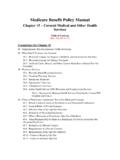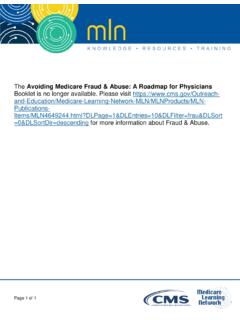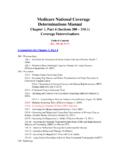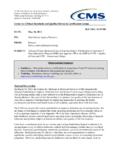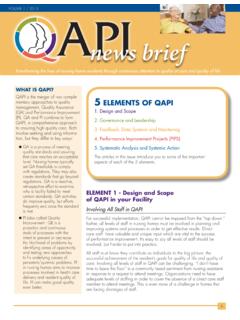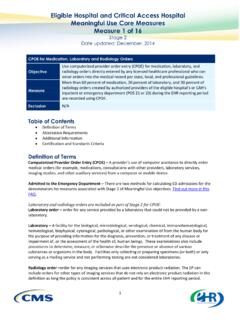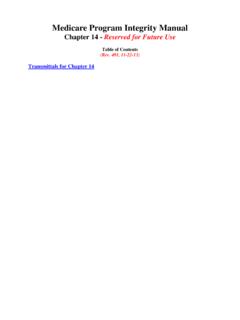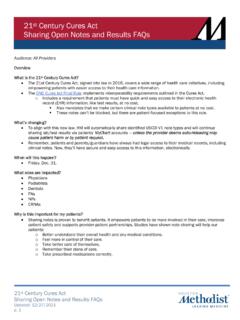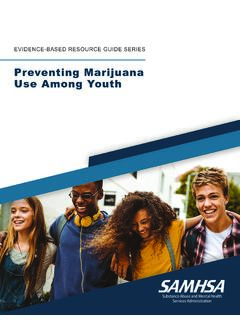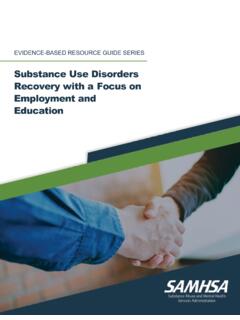Transcription of INTEROPERABILITY AND PATIENT ACCESS FINAL RULE …
1 Office of Burden Reduction and Health Informatics (OBRHI) Health Informatics and INTEROPERABILITY Group (HIIG) Unique Agency Identifier: Overview The contents of this document do not have the force and effect of law and are not meant to bind the public in any way, unless specifically incorporated into a contract, as directed by a program. This document is intended only to provide clarity to the public and regulated payers regarding existing requirements under the law, specifically, the May 2020 INTEROPERABILITY and PATIENT ACCESS FINAL rule (CMS-9115-F)(85 FR 25510). The entities to whom this guidance applies include Medicare Advantage (MA) Organizations and Medicaid Managed Care Plans, State Medicaid Agencies, Children's Health Insurance Program (CHIP) Agencies and CHIP Managed Care Entities, Issuers of Qualified Health Plans (QHP) on the Federally-facilitated Exchanges (FFEs) (referred to in this document as impacted payers ) and Health Care Providers.
2 The information herein addresses certain requirements for impacted payers to build application programming interfaces (APIs), and (for certain impacted payers) to conduct payer-to-payer exchanges; and requirements for certain providers, to include digital contact information in the National Provider and Payer Enumeration System (NPPES), and transmit Admission, Discharge and Transfer Notifications (ADT). This communication was printed, published, or produced and disseminated at taxpayer expense and issued on May 7, 2021. For the regulatory requirements on impacted payers referenced in this guidance, see 42 CFR part 422 for Medicare Advantage plans; 42 CFR part 431 for state Medicaid fee-for-service programs; 42 CFR part 438 for Medicaid managed care plans, 42 CFR part 457 for CHIP programs, and 45 CFR part 156 for QHP issuers on the FFEs.
3 For the regulatory requirements related to API standards finalized by Office of the National Coordinator for Health Information Technology (ONC) in the 21st century cures Act: INTEROPERABILITY , Information Blocking, and the ONC Health IT Certification Program FINAL rule (85 FR 25642), see 45 CFR part 170. INTEROPERABILITY AND PATIENT ACCESS FINAL RULE (CMS-9115-F) FREQUENTLY ASKED QUESTIONS (FAQs) 2 PATIENT ACCESS API 1. Question. Are impacted payers required to convert large unstructured documents like portable document formats (PDF) to Fast Healthcare INTEROPERABILITY Resources (FHIR) to support the clinical data exchange requirements of the PATIENT ACCESS API? In other words, are impacted payers required to convert documents to FHIR to identify clinical data elements that may or may not be present on a PDF or fax?
4 Response. Impacted payers ( , MA organizations, Medicaid and CHIP FFS programs, Medicaid managed care plans, CHIP managed care entities, and QHP issuers on the FFEs) are required to make claims, encounter and clinical data, including laboratory results1 available through the PATIENT ACCESS API. CMS encourages impacted payers to make as much data available to patients as possible through the API to ensure patients have ACCESS to their data in a way that will be most valuable and meaningful to them. In the FINAL rule, we said that the PATIENT ACCESS API must meet the technical standards as finalized by HHS in the ONC 21st century cures Act FINAL rule, the content and vocabulary standards adopted at 45 CFR part 162 and 42 CFR and the United states Core Data for INTEROPERABILITY (USCDI) version 1, also finalized by HHS (see citations below).
5 2 Large documents, such as PDFs or a scan of a fax may or may not include data elements in the USCDI. CMS encourages payers to follow industry best practices to map data that a payer maintains as part of an enrollee's record as a discrete data element to USCDI data elements or a FHIR resource and make it available through the PATIENT ACCESS API. However, CMS does not require payers to manually go through large files that cannot be parsed into data elements efficiently for the purposes of this API. The FINAL rule did not require payers to include these large files as data available via the API. 2. Question. What is the requirement for impacted payers to maintain their data? Please clarify the intended meaning of the word maintain. Response. The INTEROPERABILITY and PATIENT ACCESS FINAL rule (CMS-9115-F) defines maintain to mean the impacted payer has ACCESS to the data, control over the data, and authority to make the data available through the API (85 FR 25538).
6 Payers are only required to make the data that they maintain in their systems available through the PATIENT ACCESS API and for exchange with other payers. If a payer does not maintain clinical information for covered patients in its systems, the payer will not have to share clinical information through the PATIENT ACCESS API or for exchange with other As discussed in the FINAL rule at 85 FR 25513, impacted payers must make available, through the PATIENT ACCESS API, data they maintain with a date of service on or after 1 42 CFR ; 42 CFR ; 42 CFR (b)(5); 42 CFR ; 42 CFR (d); and 45 CFR 2 42 CFR (c)(3)(i); 42 CFR (c)(3); 45 CFR (c)(1); 45 CFR ; 45 CFR 3 42 CFR (h) and (b)(5); 45 CFR (i)(1). 3 January 1, 2016 forward for all current enrollees.
7 Impacted payers must follow any other applicable federal or state laws regarding data retention requirements for records. 3. Question. Are impacted payers required to provide a single point of ACCESS for the member through the PATIENT ACCESS API? May a payer require a PATIENT to use multiple portals to ACCESS their data? Response. In order to meet the requirements finalized for the PATIENT ACCESS API, impacted payers are required to make all claims/encounter data, and clinical data they maintain available through a FHIR-based This FHIR-based API allows a third-party software application ( app ) of enrollees choosing to ACCESS the data easily. Payers can set up their APIs in a way that works best for their situations, but ultimately, the data must be available through an API that is conformant with the technical, content, and vocabulary standards adopted in the INTEROPERABILITY and PATIENT ACCESS FINAL rule (CMS-9115-F) and ONC 21st century cures Act FINAL rule (45 CFR and ).
8 4. Question. CMS has suggested that industry consider using the CARIN for Blue Button Implementation Guide (IG) for the PATIENT ACCESS API. The current version of the CARIN for Blue Button IG (STU 1 ) 5 does not enable the inclusion of certain claims data ( dental and vision claims). Will an impacted payer be considered compliant with the PATIENT ACCESS API provision of the INTEROPERABILITY and PATIENT ACCESS FINAL rule if it uses the suggested CARIN for BlueButton IG? Response. Yes, from a technical perspective, if a payer uses the suggested IGs, and follows the IGs to specification to build their PATIENT ACCESS API, the payer could be in compliance with the FINAL rule (85 FR 25524). The INTEROPERABILITY and PATIENT ACCESS FINAL rule requires that payers must make available adjudicated claims, encounters and clinical data that they The FINAL rule does not preclude vision or dental claims.
9 When an updated version of the suggested Implementation Guide for the PATIENT ACCESS API (the CARIN for Blue Button IG) is available for use which enables inclusion of additional claim types, impacted payers may use the updated version. 4 42 CFR ; 42 CFR ; 42 CFR (b)(5); 42 CFR ; 42 CFR (d)(2); 45 CFR 5 6 42 CFR ; 42 CFR ; 42 CFR (b)(5); 42 CFR ; 42 CFR (d)(2); 45 CFR 4 Payer-to-Payer Data Exchanges 5. Question. Does the FINAL rule allow payers impacted by the payer-to-payer data exchange requirements to accept another payer s requests for a payer-to-payer data exchange on behalf of a member? Can a health plan be considered the enrollee s personal representative for the purpose of payer-to-payer data exchange?
10 Response. The requirement(s) for payer-to-payer exchange apply only to certain impacted payers: MA organizations, Medicaid managed care plans, CHIP managed care entities, and QHP issuers on the FFEs. There are currently scenarios where payers can exchange data without a request, such as for payment and health care operations,7 but the CMS INTEROPERABILITY and PATIENT ACCESS FINAL rule (CMS-9115-F) imposes a requirement for certain impacted payers to send, at a current or former enrollee's request (or at the request of a personal representative), specific information they maintain with a date of service on or after January 1, 2016 to any other payer identified by the current enrollee or former CMS noted in the FINAL rule that when we discussed patients , we acknowledged a PATIENT 's personal Per the Health Insurance Portability and Accountability Act (HIPAA) privacy regulations at 45 CFR (g)
